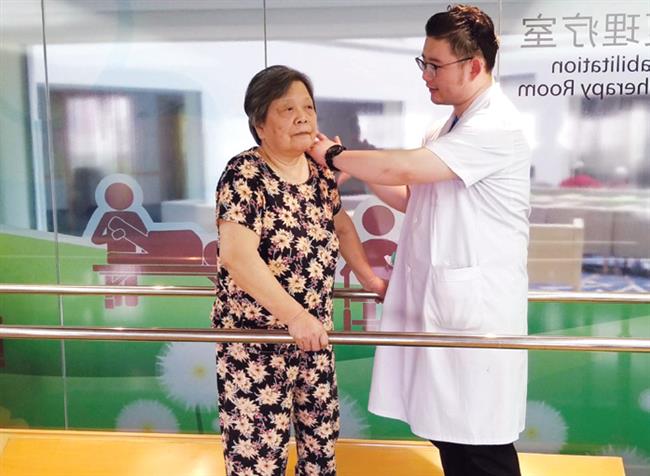Long-term care scheme eases burdens

A senior resident gets a manicure at home in Putuo District.
A long-term care insurance program for senior citizens in Putuo District is relieving a heavy burden on the elderly and their families.
Citizens aged 60 or over who need long-term care, no matter where they stay — at home, in nursing homes or hospitals — can apply for the program as long as they are covered by public medical insurance.
Shanghai launched a long-term care insurance program for seniors in January 2018, with funding for in-home care. Putuo was one of the first three districts to test the program.
By the end of last year, 30,808 Putuo seniors had applied for the insurance and 24,668 have received community and in-home care, while the rest are being taken care of at nursing homes, according to the Putuo Civil Affairs Bureau.
In Yichuan Nursing Home, considered as one of the most beautiful riverside care homes, 96 percent of the elderly among its 459 inhabitants are covered by the long-term care insurance.
Each month, the nursing home subsidize 290,000 yuan (US$43,283.58) for those eligible through the insurance scheme. The nursing home is then reimbursed by the district’s human resources and social security bureau at a later date, said Shan Xiufang, director of the nursing home.
“The insurance program has not only relieved a family’s economic burden but also eased the mental pressure on the seniors,” said Shan.
A senior surnamed Zhu living in the No. 1 Taopu Nursing Home, for instance, saves 765 yuan a month toward the 4,000-yuan monthly payment. She now only pays 3,235 yuan to the nursing home, after getting covered by the long-term care insurance.
Putuo District government will continue to optimize a long-term care insurance program and subsidize policies and play a key role in ensuring basic care demands are met for the older generation, said Zhao Fei, deputy director of Putuo Civil Affairs Bureau.
The district is also encouraging qualified nursing homes to take part in the long-term care insurance program while offering the community and in-home care services. This includes the installation of smart sensors that can detect danger and determine when buildings need renovations.
A trial operation will be conducted in Putuo this year which will bring in caring beds and facilities, along with nursing services, to the seniors’ homes to further promote in-home caring services.

A doctor offers rehabilitation therapy to a senior resident in Putuo.
Ninety percent of local seniors are taken care of at home.
The tradition of filial piety means children are reluctant to put frail parents in nursing homes.
Zhang, a 93-year-old resident of the Caoyang Community in Putuo, receives around 2,000 yuan in government funding per month, nearly double her previous subsidy, after being covered by the long-term care insurance.
Further improvements for the elderly in Putuo include the installation of 10,000 intelligent sensors on doors, beds and ceilings at the district’s nursing homes, hospitals or the homes of those living alone. The sensors can detect falls, monitor heartbeats and send alarms to an urban management center or neighborhood committee.
A “time bank” program will be expanded to senior care in Putuo.
Younger seniors are encouraged to take care of their older counterparts.
The caregivers can then receive the same hours of services when they get older themselves.
The district also plans to offer residential renovations to 400 seniors living in impoverished conditions at home.
Kitchens and bathrooms will be improved to ensure the comfort of residents.
In 2018, Putuo has introduced 340 more senior care beds and renovated 86 beds for those suffering from dementia.
Three new community daycare centers for the elderly have been built, along with two service centers, five activity rooms and 10 community canteens for the seniors.
Citywide, there are more than 4.3 million citizens aged over 60, and 7 percent of senior citizens need long-term care after partially or completely losing their ability to care for themselves.
















